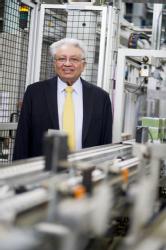WMG News
Expert comment: Professor Lord Bhattacharyya
Apprentices are secret weapon in fight for productivity argues Professor Lord Bhattacharyya
 Commenting in the Sunday Times (13 September), Professor Lord Bhattacharyya, Chairman of WMG, University of Warwick, says the neglect of technical education over the past decades means we lag our biggest competitors and success depends on understanding business needs.
Commenting in the Sunday Times (13 September), Professor Lord Bhattacharyya, Chairman of WMG, University of Warwick, says the neglect of technical education over the past decades means we lag our biggest competitors and success depends on understanding business needs.
He says "A highly skilled workforce is the key to creating virtuous circle where productivity improvement spurs increased investment which in turn drives productivity growth. The neglect of technical education over past decades means we lag our major competitors.
Unless skills training is given and funded by industry, it will be poorly targeted. We (WMG) succeed because we focus on understanding business needs, offering research and education that is both academically excellent and industrially relevant.
It is this vital role of the private sector in technical sector in technical education, which demonstrates the need for statutory apprenticeship levy, so that skill providers respond to business needs, not just government grants.
Expert Comment: Dr Stuart Coles
 Dr Stuart Coles is an Assistant Professor in Sustainable Materials and Manufacturing His main research interests are based around sustainability and the substitution of natural materials into industrial products.
Dr Stuart Coles is an Assistant Professor in Sustainable Materials and Manufacturing His main research interests are based around sustainability and the substitution of natural materials into industrial products.
Commenting on the Automobile Association (AA) joining green groups in warning that changes in energy policy will harm the climate he said:
“Incentives are needed on low-emission vehicles to keep them attractive to consumers whilst technology catches up and battery-powered cars are able to compete in terms of function with conventional vehicles."
“In his Budget, Chancellor George Osborne announced that the nil vehicle excise duty (VED) band for clean petrol cars would be restricted in future to electric vehicles. This removes a tax break for clean petrol cars and hybrids, which will from 2017, attract the same VED as gas guzzlers."
“The Government’s policy on VED is damaging to the environment as effective low carbon options, such as plug-in hybrids, will now fall into the same tax band as many other higher emission vehicles. Whilst clean electric vehicles are available, they are not currently able to travel much farther than 100-120 miles (the maximum for the Nissan Leaf is 124 miles with perfect conditions) and are therefore not a viable option on many journeys.”
Expert Comment: Professor Jan Godsell
 Supermarket price war 'hitting food supply firms’: It doesn’t need to be like that
Supermarket price war 'hitting food supply firms’: It doesn’t need to be like that
There is an unfortunate inevitability that the difficulties faced by the supermarkets resulting in the increased intensity of the price war are being passed onto their suppliers. However, if the boards of the supermarkets were to truly understand the principles of good supply chain management they would realize that there was another, and better way. In the words of the 1980s band Erasure, It doesn’t need to be like that.
Expert Comment: Professor Lord Bhattacharyya
 Government should use apprenticeship levy to support institutions that boost skills, argues Professor Lord Kumar Bhattacharyya.
Government should use apprenticeship levy to support institutions that boost skills, argues Professor Lord Kumar Bhattacharyya.
Chairman of WMG also says industry must demand programmes that are “built on real business need”
Professor Lord Kumar Bhattacharyya, Chairman of WMG at the University of Warwick, has called for a statutory apprenticeship levy to support technical education programmes to transform training and skills.
Speaking in a House of Lord’s debate on the most recent government budget, which includes a proposal for a statutory apprenticeship levy, Professor Lord Bhattacharyya said that he strongly supports the levy but cautioned that industry must be involved with its design and that “we should be challenging Universities, colleges and business to design technical education programmes together”.
Professor Lord Kumar Bhattacharyya considers challenges facing automotive sector
 Professor Lord Kumar Bhattacharyya, Chairman and Founder of WMG at the University of Warwick, explores the research challenges facing the automotive sector in his first paper for a Royal Society journal.
Professor Lord Kumar Bhattacharyya, Chairman and Founder of WMG at the University of Warwick, explores the research challenges facing the automotive sector in his first paper for a Royal Society journal.
In “Smarter – lighter – greener: research innovations for the automotive sector” he writes about how legislation controlling vehicle emissions has brought urgency to research underpinning the industry, with a more rapid development of technologies than at any time in the past century.
Expert comment: Professor Carsten Maple
 Professor Carsten Maple of the Cyber Security Centre at WMG/University of Warwick has provided his analysis of the news that repeat offenders of anti-Semitism on social media could be given prevention orders:
Professor Carsten Maple of the Cyber Security Centre at WMG/University of Warwick has provided his analysis of the news that repeat offenders of anti-Semitism on social media could be given prevention orders:
This week an All Party Parliamentary Group has suggested that repeat offenders of anti-Semitism on social media should be given prevention orders, as can be used for those convicted of sexual offences.
It is important to recognise that this is a serious issue. The number of reported cases of anti-Semitic content has increased recently, and it is likely a small fraction of the total number of cases. Hate crimes such as this, and other crimes such as cyberstalking, can have a considerable impact on victims and the ubiquitous nature of the Internet can mean there is little escape for victims and can ensure that it pervades all aspects of life, personal and professional. It is important that the law considers the impact a crime can have on the victim.
WMG Comments: End of BOGOFs?
 A recent report by the House of Lords European Union Committee has called for the development of a policy framework, within the EU, aimed at tackling the issue of food waste. One of the key recommendations picked up in the media, was the issue of incentives and promotions such as ‘Buy One, Get One Free’ (known as BOGOF) deals. The report suggested that actions such as BOGOFs can pass food waste on to the consumer and encourage them to buy in larger volumes than required, and has proposed that such tactics should end.
A recent report by the House of Lords European Union Committee has called for the development of a policy framework, within the EU, aimed at tackling the issue of food waste. One of the key recommendations picked up in the media, was the issue of incentives and promotions such as ‘Buy One, Get One Free’ (known as BOGOF) deals. The report suggested that actions such as BOGOFs can pass food waste on to the consumer and encourage them to buy in larger volumes than required, and has proposed that such tactics should end.
This recommendation has been supported by Professor Jan Godsell, Professor of Operations and Supply Chain Strategy at WMG, who has told the Birmingham Post that BOGOF offers ultimately don’t benefit customers, even though they appear to be good value at the time.
that BOGOF offers ultimately don’t benefit customers, even though they appear to be good value at the time.
Jaguar Land Rover funds new Professor at WMG to lead key Hybrid / Battery Electric Vehicle Digital Product Innovation
 Jaguar Land Rover has announced that they are to fund a new Chair (Professor) in WMG at the University of Warwick as a key element in their strategic relationship with WMG.
Jaguar Land Rover has announced that they are to fund a new Chair (Professor) in WMG at the University of Warwick as a key element in their strategic relationship with WMG.
The new Chair is not expected to be a lone appointment, they will lead a new team which will achieve international research leadership in simulation support of the vital complex hybrid and battery electric component and systems innovation, so essential to enable JLR to embrace and robustly deploy these new vehicle technologies and continue to successfully compete in the automotive sector into the Low Carbon future.
Lord Bhattacharyya tells Financial Times that we need new Bank to back manufacturing
 WMG Director has given an extensive interview to the Financial Times Manufacturing Editor Peter Marsh calling on the Government to create a new Bank to back manufacturing. He said the new institution was needed to establish a “change of culture” towards manufacturing businesses by conventional banks which he accused of being too “short-term” in their approach.
WMG Director has given an extensive interview to the Financial Times Manufacturing Editor Peter Marsh calling on the Government to create a new Bank to back manufacturing. He said the new institution was needed to establish a “change of culture” towards manufacturing businesses by conventional banks which he accused of being too “short-term” in their approach.
WMG statement on the sale of Jaguar Land Rover to Tata
Ford Motor Company has announced the sale of UK brands Jaguar and Land Rover to Indian company Tata  Group.
Group.
WMG has worked with both companies on research and development for many years and the director, Professor Lord Kumar Bhattacharyya, had this comment: "This is excellent news for Tata, for Ford and for Jaguar Land Rover. It is excellent news for the motor industry and for the West Midlands region. Tata has accepted the business plan for the two brands and there will be no closures of UK plants. These iconic cars are in safe hands with Tata which has proved its capacity for running businesses in the UK with its acquisition of Corus steel. It is a win-win situation for everyone."
He added: "We have worked with both Jaguar Land Rover and Tata for many years and we hope to do so for many years to come. The company will continue to develop the brands and invest in new technology and, as our primary interest is in enhancing the competitiveness of UK manufacturing, we hope to be able to help them do that through world-class research and education."
For media enquiries and interview requests, please contact Zoe Howard on 07824 540845.
Tata press release: http://www.tata.com/tata_motors/releases/20080326.htm
Ford press release: http://media.ford.com/article_display.cfm?article_id=27953
BBC online: http://news.bbc.co.uk/1/hi/business/7313380.stm
Birmingham Post: Tata means a better future, says Lord Bhattacharyya
